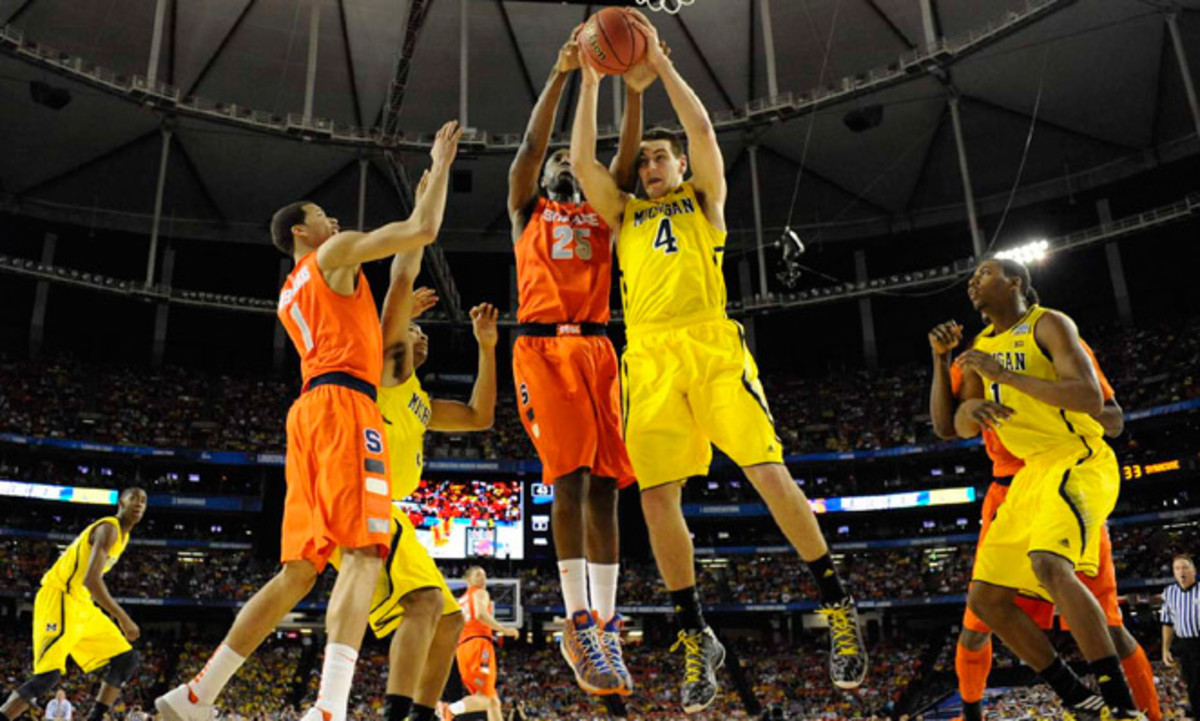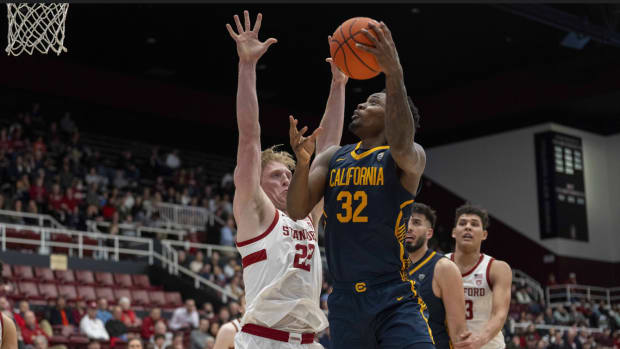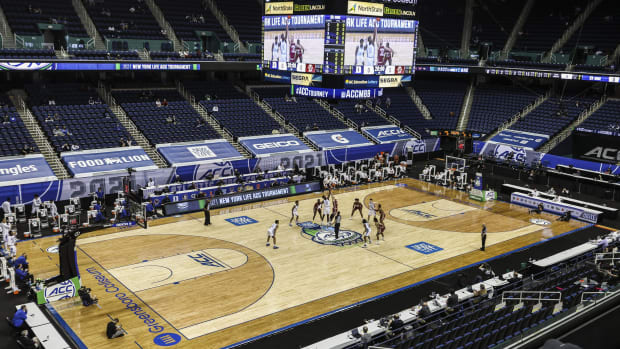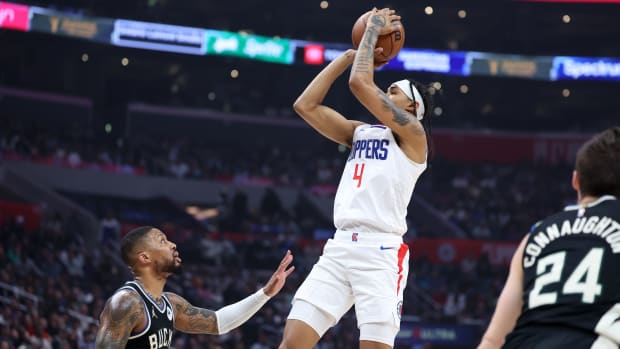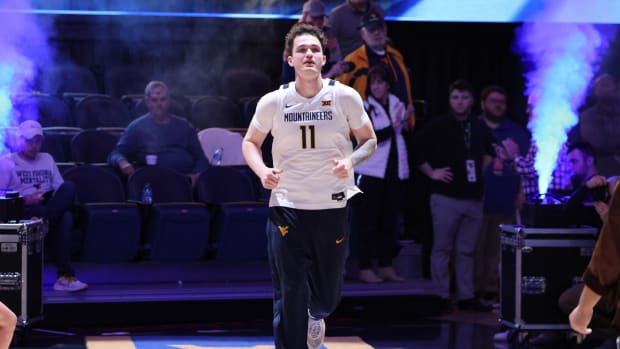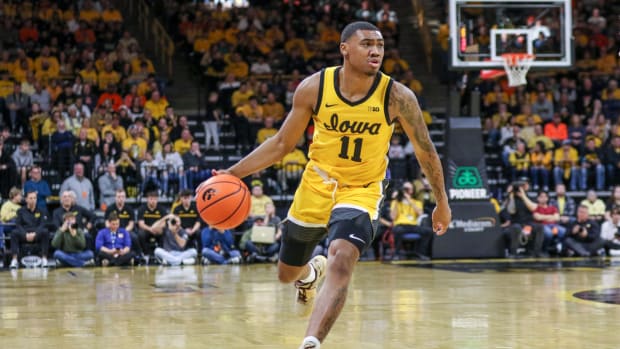Michigan's McGary is Final Four star, but Carter-Williams stumbles
ATLANTA -- At the end, for just the final 28.1 seconds, both players were on the bench, and on this night that is where the resemblance ends. On one Georgia Dome sideline late Saturday night was Michigan freshman center (and in this case, that positional description is often inadequate and unfair) Mitch McGary, seething at himself for missing two free throws?even when given a lane violation mulligan and a third attempt?that could have nearly sealed a Final Four victory. On the other was Syracuse sophomore (but truly a first-year full-time player) point guard Michael Carter-Williams, angry at calls that fouled him out of his first?and quite possibly last?Final Four game.
For McGary, Michigan's 61-56 victory in a game that, over the course of a long night turned from opera into dirge but sent the Wolverines to their first national championship game since 1993 (vacated), was another step upward in a rapid and dizzying postseason ascension from bench big to potential NBA first-round pick. His performance included not only measurables like 10 points, 12 rebounds and six assists (one-third of his season's total entering the game), but also two lookaway passes and a dime from the middle of the fast break, as well as a couple of reminders late in the game of why he might not be quite ready for The League.
For Carter-Williams, there was no such dichotomy: It was bad from to start to finish. He made just one of six shots to finish with two points, and had five turnovers and only two assists. He took just one outside shot (and missed it), and was called for two charging fouls and an oddball screen-elbow foul with 1:14 to play that fouled him out of the game and left Syracuse with reserve sophomore point guard Trevor Cooney not only handling the ball, but also missing a desperation drive, down three points, on the Orange's last possession of the game.
College basketball has been transformed largely into the province of the inexperienced and the accelerated. It is significant that Louisville, after its narrow escape in the first game on Saturday night against Wichita State, will play Michigan for the national championship Monday night with three juniors and a senior in its rotation. (And that Kentucky's one-and-done assembly line won a national title last year only with significant help from upperclassmen). Yet the sport is now built on freshmen and sophomores with a lifetime's worth of AAU and high-level high school experience. Live with them, die with them.
Hence, just past midnight in Atlanta, Carter-Williams was in a corner of the quiet Syracuse locker room, peeling off towels and putting on street clothes before trying to explain a terrible game. "I wasn't on my game today,'' he said. "It's frustrating. I couldn't get into a rhythm.''
And 20 minutes later, McGary returned from his appearance on the formal interview dais and held court in full uniform in the Michigan locker room, standing in all his 6-foot-10, buzzcut glory as if he could talk all night. He has become the story of the tournament, non-Kevin Ware division. Late in the season, when Michigan stunningly was beaten by Big 10 doormat Penn State, McGary played only eight minutes. In the tournament, he has been not just a beast (though he has been a beast), but also a revelation who once delivered newspapers on a unicycle and this season became effective only when he stopped eating frat boy junk food staples.
It's possible that within weeks, both Carter-Williams and McGary will be former college basketball players. Carter-Williams is 6-6 and spidery, with a high, pulsating dribble and an improving shot (though little of this was on display Saturday night). "I think the NBA will have him now,'' said Syracuse coach Jim Boeheim in the week before the semifinals. Boeheim said he doesn't know if Carter-Williams is leaving, but won't surprised if he does. The Orange have recruited Tyler Ennis and are prepared to start him as a freshman point guard next year.
Early in Final Four week, McGary told reporters that he was "100 percent'' certain to return to Michigan, but backed off on that Friday, saying that he will make a decision later in the spring, before the NBA declaration date. He is not only large, but possesses a freakish collection of skills: Soft hands, vision and quick feet. He remains a work in progress, but there's little doubt the NBA would happy to mold the clay.
On Saturday night, McGary helped Michigan turn an early 14-9 deficit into a 31-21 lead with a 22-7 run that included a fast break feed to Tim Hardaway, Jr. and a high-post dumpdown to Hardaway from the middle of the Syracuse zone, which struggled to adapt to McGary's versatility. "He was really good,'' said Boeheim of McGary. "Especially in the first half. ''
It was the fast break to Hardaway that ignited the antiseptic Dome crowd. "I've seen that before,'' said Michigan freshman forward Glenn Robinson III, who played AAU ball with McGary. "I've never seen it in practice, but I saw it in AAU games all the time. That's Mitch.''
The high-post assist was a modest lookaway, but four minutes into the second half, McGary fed Robinson on a lookaway dish from the high post that smacked of Showtime Magic. McGary reveled in re-telling and embellishing the plays. "Three-on-one fast break, that's how I like to play,'' said McGary, poker-faced. "Look one way, feed Tim for the easy layup. I had two lookaways. [Michigan] Coach [John] Beilein doesn't like me doing that stuff, but it worked tonight, so he can't say anything.''
Beilein, in fact, said plenty. When asked postgame as to when McGary seemed to elevate his work, Beilein said, "The fire's always been burning. There's always been something there. He's made these incremental steps all year long. ... The best is yet to come. He's got, as I've said, a high ceiling to his overall game.''
Michigan is an exceptionally young team. Hardaway and Jordan Morgan are the only rotation players older than sophomores. Hence, there are stretches of terrific play followed by stretches of terrible play. McGary had six points, seven rebounds and four assists in the first half, and Michigan scored 36 points before the break (Marquette had only 39 all night in the regional final last Saturday in Washington), but then slumped to 17 in the first 16 minutes of the second half. McGary was 2-for-3 in the first half and 2-for-5 in the second, when Syracuse dropped off him at the high post, making the decision that he was less dangerous as a shooter than as a distributor.
In one sequence, McGary banged a shot off the bottom of the backboard, recovered the ball and then threw wildly toward sophomore point guard Trey Burke, and was picked off by Carter-Williams. "Those are the kinds of things we saw in abundance early in the year from Mitch,'' said Michigan assistant coach Bacari Alexander. "Now you don't see them very often at all.'' With 48.7 seconds let and Michigan up four points, 57-53, he missed two free throws badly.
Carter-Williams is a year ahead of McGary. A year ago, he expected to see a lot of playing time at Syracuse, but was seldom in the rotation behind senior Scoop Jardine, junior Brandon Triche and sophomore Dion Waiters. "I had to give Scoop 30 minutes, Dion, who was the fourth pick in the NBA draft, 25 minutes, and Brandon 25 minutes,'' said Boeheim last week. "That's 80 minutes. That's all I had for the two guards. There are years when Michael would have played a lot. Not last year.''
Carter-Williams's mother, Mandy Carter-Zegarowski, talked to Boeheim during the 2011-'12 season. "It was hard for Michael to figure out how to be a part of a winning team when he wasn't playing,'' said Carter-Zegarowski. "He had never experienced that.''
Boeheim told her, "I know you don't like me this year. You'll like me next year.''
Carter-Williams started 39 games for the Orange and averaged 12.1 points and 7.6 assists a game. He was one of the best point guards in the country. Yet on Saturday night, Burke and Hardaway aggressively defended Carter-Williams. "They did a good job of staying in front of me,'' Carter-Williams said. "I tried to attack the rim and I got a couple of calls that could have gone either way. One block and one charge." And then the screening foul that ended his night. After the call, with 74 seconds left and Syracuse making its last, desperate run, Carter-Williams walked away from the official, and dropped the ball so that it rolled away, an act of youthful petulance symbolizing the night.
